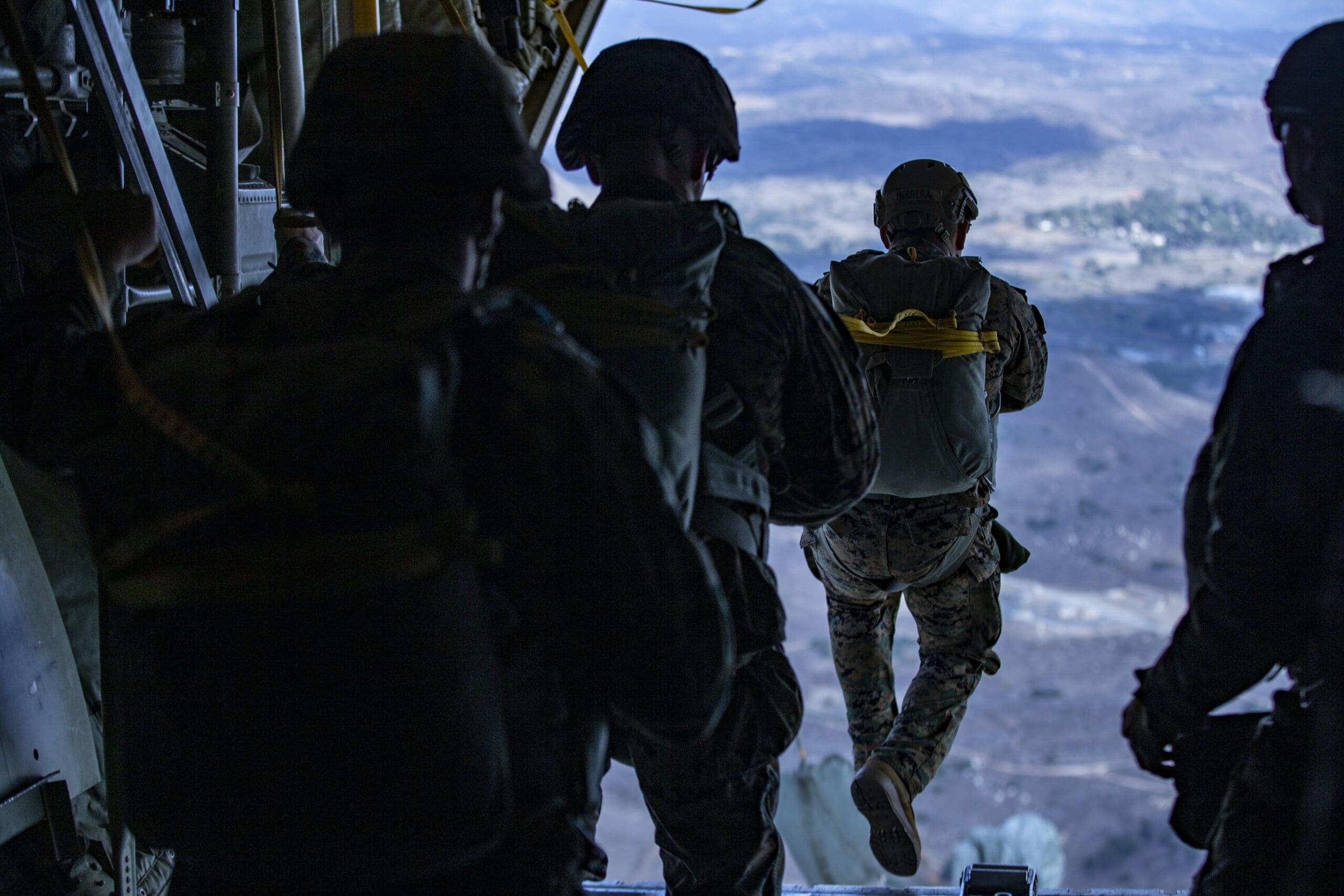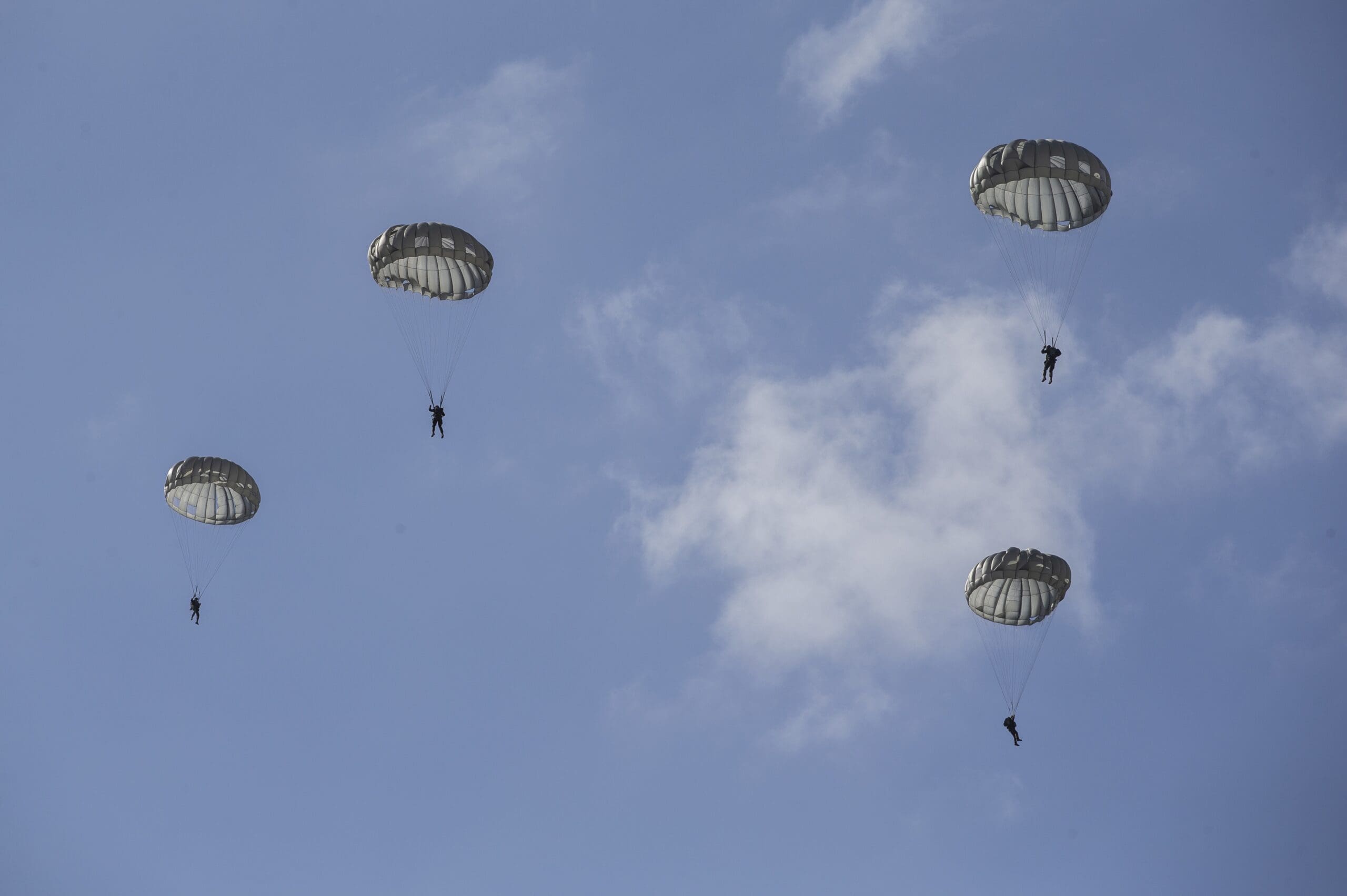
CAMP PENDLETON, Calif. —
Marines with Air Delivery Platoon, Landing Support Company, 1st Transportation Support Battalion, 1st Marine Logistics Group, coordinated a parachute operation at Drop Zone Basilone to refresh their Marines on low-level static line jumps and aerial resupply.
1st TSB invited other Pendleton units to participate in the training event, enabling Marines with 1st Marine Division and I Marine Expeditionary Force Information Group with airborne and jump missions to gain proficiency and remain current with their jump training.
The aerial delivery Marines coordinated with 3rd Marine Aircraft Wing to use a KC-130J Hercules as part of the training. In addition to the actual parachutists, the Marines loaded the aircraft with container delivery systems and door bundles to simulate a resupply.
“It’s important that we do this training, because it allows us to practice in rugged terrain and puts us in real-world environments that we can fine tune our skill sets in.”
-Gunnery Sgt. Kyle Bridges, 1st TSB aerial delivery chief
After taking off from Marine Corps Air Station Camp Pendleton, the aircraft made several passes over the drop zone to line themselves up before doing the physical drop. Once the Marines jumped out of the aircraft, the supply bundles soon followed.
The air delivery Marines usually conduct two or three parachute operations each month to help maintain their proficiency. Being stationed on Pendleton, and having MCAS Camp Pendleton nearby, streamlines the planning process for each jump.

“Having the air station right here is crucial to us,” said 1st Lt. Amy Horney, the Air Delivery Platoon commander with LS Company, 1st TSB. “If we didn’t, if we had to go to Miramar or Yuma, or something like that, it would take a huge toll on the logistical planning that we have to do each time.”
All of the different training areas on Camp Pendleton also provide some advantages for the Marines, according to Horney.
“With Camp Pendleton being so large, there are multiple drop zones on the base,” explained Horney. “We can go all the way up north, we can stay down here by the air station. We can go toward different units to help them out and take less of a toll on their logistical planning. Camp Pendleton is definitely a golden site for us in order to do those two to three operations a month, in addition to all the other exercises we support.”
Story by Lance Cpl Andrew Cortez, Marine Corps Base Camp Pendleton
Photos by Lance Cpls Drake Nickels and Andrew Cortez


There is no such thing as a ‘perfectly good’ airplane – even brand new airplane waiting for a customer’s acceptance is going to have something that can be improved on – and any inspector or aircrew that doesn’t find it is slack…..
Having said that, I’ve dropped troops on Basilone DZ many times….
Notice with the Marines, that it’s the POG’s (and it’s POG, not Pogue – Pogue being a member of the seminal Irish punk-folk band of the same name) training for parachute insertion, not Infantry. Someone needs to tell the Army that large scale parachute drops of Infantry is obsolete in modern warfare, as the German’s learned at Crete during World War II.
If it’s “POG” where’s the T?
‘Pogue’ was in use as far back as WWI, which obviously pre-dates the formation of Pogue Mahone (the first band name of The Pogues, and Gaelic for “kiss my ass”), so no, its not the backronym POG.
https://archive.org/details/othersideofsile000loug/page/6/mode/2up?q=pogue
https://archive.org/details/dictionaryofsold00john/page/234/mode/2up?q=pogue
Obsolete in modern warfare. Amphibious Landings, Airborne operations, Mechanized raids—tanks… artillery… Forcibly entry into foreign lands isn’t easy. Taking and holding terrain will always be part of winning.